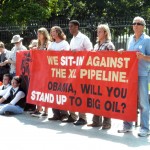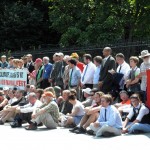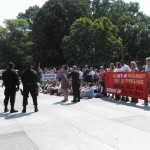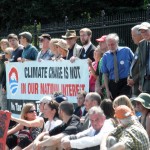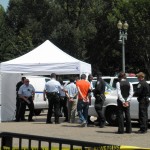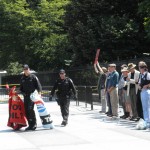2:45 p.m. update:
WASHINGTON — The Tar Sands Action sit-in started at 11 a.m. today, with protesters who had volunteered to be arrested lining up and sitting on the sidewalk in front of the White House. Others protesters who had not signed up to be arrested remained across the street in Lafayette Park.
The protesters in the sit-in held signs that read: “Climate change is not in our national interest” and, “We sit-in against the XL pipeline. Obama, will you stand up to big oil?” They chanted slogans, too, yelling: “Hey-hey! Ho-ho! Keystone oil has got to go!”
The 1600 block of Pennsylvania Avenue is D.C. Metropolitan Police jurisdiction, but the White House sidewalk and Lafayette Park across the street are the jurisdiction of the U.S. Park Police. Groups larger than 25 or people carrying signs must keep moving along the sidewalk, in order to keep it open for tourists and maintaining the scenic value of the area and the White House.
Shortly after the sit-in began, the U.S. Park Police issued three warnings over a megaphone, each warning three minutes apart. Then, at about 11:40, they started arresting protesters. By 1:15 p.m., all 65 participants in the sit-in, including Vermont environmentalist Bill McKibben and environmental lawyer Gus Speth, had been arrested.
The mood was calm and dignified throughout the day, even during the arrests. In fact, the protesters were almost cheerful. The Tar Sands Action website said volunteers had to be “dignified in dress and demeanor – these are serious issues, and we want to be taken seriously.”
The arrests were met with cheers and applause from both those in front of the White House and in Lafayette Park. “You’re a hero!” someone called as a woman was arrested.
Each day for two weeks protests will be held here. Each day will bring a new wave of activists to stage sit-ins in an attempt to be arrested, an effort to draw national attention to the protesters’ cause.
Even environmentalists across the Atlantic found a way to be involved in Saturday’s action.
Environmentalists in Germany gathered at the Canadian embassy in Berlin for what they dubbed on Facebook the “Tar Sands Bike Tour,” a tour of oil sands involvement in Berlin, with stops at gas stations, embassies and ministries and finishing with an address aimed at President Barack Obama at the Brandenburg Gate.
- Environmentalists protested at the White House against the Keystone XL pipeline. (Alexandra Arkin / MNS)
- Environmentalists plan to protest against the Keystone XL pipeline every day from Aug. 20 through Sept. 3. (Alexandra Arkin / MNS)
- The police arrested 65 protesters on Saturday. (Alexandra Arkin / MNS)
- Environmentalists call the oil sands in the proposed Keystone XL pipeline “the largest carbon bomb in North America.” (Alexandra Arkin / MNS)
- Protesters who did not want to be arrested supported those holding the sit-in from across the street in Lafayette Park. (Alexandra Arkin / MNS)
- Bill McKibben, Vermont activist, author, and leader of the protest, was arrested on the first day of the sit-ins. (Alexandra Arkin / MNS)
- Police arrest protesters at Saturday’s sit-in. (Alexandra Arkin / MNS)
- Police confiscated protesters’ signs as the arrests drew to a close. (Alexandra Arkin / MNS)
————————
10:20 a.m. report:
WASHINGTON – As the State Department prepares to release its final analysis of the environmental impact of the proposed Keystone XL oil pipeline any day, protesters from across America and Canada begin two weeks of protests and sit-ins at the White House against the pipeline, starting this morning.
Organizers say it may be the largest civil disobedience action by environmentalists in the U.S. More than 2,000 people have signed up with the Tar Sands Action group to participate.
The controversial pipeline would carry a type of oil called oil sands or tar sands from the Canadian province Alberta to Texas. Environmentalists say that oil sands petroleum is highly corrosive and would cause leaks in the pipeline, and that it emits more greenhouse gases when burned than regular oil.
But TransCanada, the company that would build and operate the pipeline, and the American Petroleum Institute – the American oil and gas industry trade association – cite studies saying the oil is no more corrosive than oil the U.S. has used for years, and greenhouse gas emissions from oil sands are less than 1 percent of estimated global greenhouse gas emissions. TransCanada also plans to use the newest technologies to prevent leaks in the pipeline, and to continuously monitor the system to shut it down if they detect a drop in oil flow because of a leak.
TransCanada filed its proposal for the pipeline with the State Department in 2008. The agency will make its final ruling later this year. If other agencies object, President Obama would make the final decision.
Both the oil and gas industry and environmentalists have issued calls for action from Obama.
Ripton environmentalist and author Bill McKibben, founder of the grassroots climate campaign 350.org, said this is an opportunity for Obama to fulfill a campaign promise. “He proclaimed, the day he was nominated, that with his arrival ‘the rise of the oceans would begin to slow and the planet begin to heal,’” McKibben said. “This is his opportunity to show that he meant it.”
But The American Petroleum Institute says granting approval for the project would allow the president to deal with another pressing problem – the 9 percent unemployment rate. “You’re looking at a project that has the ability to bring (20,000) jobs,” said Cindy Schild, refining issues manager for the American Petroleum Institute. “President Obama was out on his bus tour talking about being ready to sign off on projects that are going to create jobs. Here’s the opportunity to do that.”

